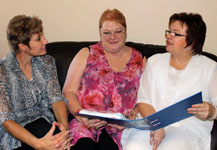Latest News Archive
Please select Category, Year, and then Month to display items
05 June 2018
Photo Supplied
 Archaeological excavations in the Wonderwerk Cave, north of Kuruman in the Northern Cape.
Archaeological excavations in the Wonderwerk Cave, north of Kuruman in the Northern Cape.
Research fellow Dr Lloyd Rossouw from the Department of Plant Sciences at the University of the Free State (UFS) recently published an article in the Nature Ecology and Evolution journal with Dr Michaela Ecker from the University of Toronto as lead author, and Dr James Brink, research fellow at the UFS Centre for Environmental Management. The findings described in “The palaeoecological context of the Oldowan-Acheulean in southern Africa” provides the first extensive paleoenvironmental sequence for the interior of southern Africa by applying a combination of methods for environmental reconstruction at Wonderwerk Cave, which have yielded multiple evidence of early human occupation dating back almost two million years ago.
Where water once was
The Wonderwerk Cave is found north of the Kuruman hills (situated in Northern Cape) a 140m long tube with a low ceiling. The surroundings are harsh. Semi-arid conditions allow for the survival of only hardy bushes, trees, and grasses. But during the Early Pleistocene, stepping out of the Wonderwerk Cave you would have been greeted by a completely different site, the researchers found. Using carbon and oxygen stable isotope analysis on the teeth of herbivores (Dr Ecker), fossil faunal abundance (Dr Brink), as well as the analysis of microscopic plant silica remains (phytoliths) excavated from fossil soils inside the cave (Dr Rossouw), the results show that ancient environments in the central interior of southern Africa were significantly wetter and housed a plant community unlike any other in the modern African savanna.
What difference does it make?
While East African research shows increasing aridity and the spread of summer-rainfall grasslands more than a million years ago, the results from this study indicate an interesting twist. During the same period, shifts in rainfall seasonality allowed for alternating summer and winter-rainfall grass occurrences coupled with prolonged wetlands, that remained major components of Early Pleistocene (more or less the period between one and two million years ago) environments in the central interior of southern Africa. That means our human ancestors were also living and evolving in environments other than the generally accepted open, arid grassland model.
UFS Faculty of Law and Department of Health join hands to combat modern day slavery
2012-10-03
 |
At this event, were from the left: Dr Adri Krieger and Dr Mariaan Kotze. Both are from the Department of Health: Directorate Forensic Services. Far right is Dr Beatri Kruger from the Unit for Children's Rights and the Department of Criminal and Medical Law at the UFS.
4 October 2012 |
Research and court cases confirm that the trade in people is a reality in South Africa. According to Dr Beatri Kruger from the Unit for Children's Rights and the Department of Criminal and Medical Law at the University of the Free State (UFS), complex challenges are faced in combating human trafficking. One of these challenges is a lack of knowledge of this crime and the difficulty in identifying trafficked victims.
To address the lack of knowledge, a number of discussions took place between Dr Kruger and delegates from the Department of Health.
A project has been initiated to address this problem in the public health sector. A need to raise awareness and provide training to medical practitioners to better understand human trafficking was identified. The most important aim of this initiative is to empower medical staff, to identify trafficked victims that visit hospitals and clinics countrywide and to also treat them appropriately in light of the severe trauma they have often been exposed to. The initiative will also empower medical practitioners to refer patients to other service providers such as social workers and psychologists.
The talks with medical practitioners from the Department of Health have led to training and awareness raising that will be provided at some of the local hospitals before the end of the year. Further training seminars are planned for medical practitioners, which will include a presentation by Dr Kruger on legal issues that are relevant for staff in the public health sector. The multidisciplinary cooperation that was established between representatives from the UFS Faculty of Law and the Department of Health has contributed substantially to a more effective response to human trafficking in South Africa.